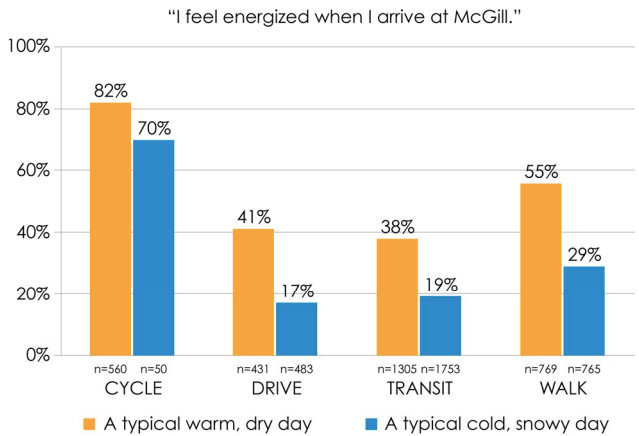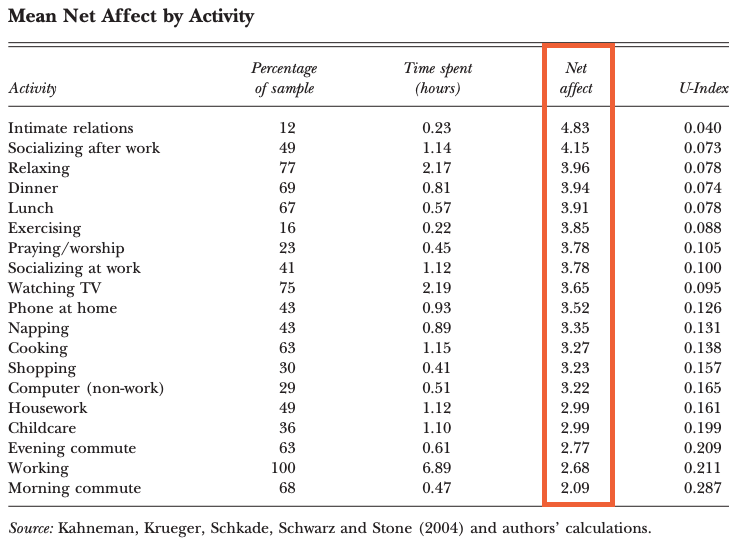Your Commute Is Bad for You, Here's How to Make It Better
- Get link
- X
- Other Apps
We've all been there: You tell people your commute is 45 minutes each way, but every day, there's a delay. An accident. A broken down train. Inclement weather. A barge hitting the bridge you have to cross to get to work and causing a four-hour traffic backup (true story).
To compensate for the inevitable delays, you leave the house earlier and earlier. And to leave earlier, you have to go to bed earlier—or be exhausted for the whole day. You spend most of the commute staring at the clock and panicking at the first sign of brake lights in the distance.
And once you're finally at work, you realize: You have to do it all over again tomorrow.
If your commute is making you miserable, join the club. There's ample scientific research showing that the length of your commute negatively impacts your productivity, your satisfaction at work and home, and both your physical and mental well-being.
What Research Says About the Impacts of a Long Commute

Countless studies have been conducted to measure the impacts of long commutes on productivity, health, and happiness, and the findings are bleak.
- A 2017 study from the University of the West of England found that "every extra minute of commute time reduces job satisfaction, leisure time satisfaction, and mental health."
- A 2015 study of European commuters conducted by Ford Motor Company found that 63% of people are late to work once a month due to traffic, and nearly all commuters leave for work early to avoid being late because of traffic hold-ups.
- A 2006 study led by Daniel Kahneman found that people feel more negative emotions during their morning commutes than any other activity they engage in throughout the rest of that day.
- A 2017 study from Mercer found that people with longer commutes are more likely to suffer from depression, to have financial concerns, to report feeling stressed by work, and to be obese—and less likely to get seven hours of sleep each night.
- A 2019 study of Australian commuters found that people with longer commutes take more unplanned absences than those with shorter commutes. Additionally, people with shorter commutes are more "relaxed, calm, enthusiastic, and productive."
No matter how you slice it, commutes are never good for you.
"People feel more negative emotions during their morning commutes than any other activity they engage in throughout the rest of that day."
Of course, there are times when having a long commute is unavoidable. There may not be jobs in your field close to your home. You may need to live further from work to take care of family members or to avoid moving your kids to a new school district. You may simply not be able to afford a home in the area where your workplace is located.
But other times, we put ourselves into a position where we suffer through commute-related stress in favor of some other incentive.
Is a Higher Salary Worth a Longer Commute?

In a 2017 article published in Harvard Business Review, researchers discussed the results of a study they conducted where they asked subjects to choose between two jobs:
- Job #1 had a 50-minute round-trip commute and paid $67,000 a year.
- Job #2 had a 20-minute round-trip commute and paid $64,000 a year.
84% of the participants in the study selected job #1, as researchers wrote, "expressing a willingness to forfeit one hour each workday to their commute—250 hours per year—in exchange for just $3,000. That's $12 an hour of commuting time—less than half their hourly rate at work!"
They concluded that people were unable to "fully appreciate the psychological, emotional, and physical costs of longer travel times."
And beyond the actual costs of commuting long distances—in terms of hours invested and travel costs like insurance premiums, gas, and car maintenance—another study found that adding an additional 20 minutes per day to your commute has the same effect on your job satisfaction as taking a 19% pay cut.
If you have a choice in how far you live from where you work, it's worth examining if the costs of a long commute are truly worth it. Taking a pay cut to work closer to home—or paying a higher cost of living to live closer to work—may be worth it if the actual and psychological costs of your commute are more detrimental than the benefits of earning a slightly higher salary.
But if there are reasons why you don't want to/can't move or find a job closer to home, there are some ways to combat the stress of a long commute to feel happier and be more productive both at work and at home.
How to Increase Your Productivity by Combating Commute-Related Stress

You may be stuck with a long commute, but that doesn't necessarily mean you have to suffer through the more detrimental consequences of commuting long, highly trafficked distances to and from work.
Researchers have found multiple ways that you can make commuting less stressful so you feel refreshed, engaged, and ready to be productive both when you get to work in the morning and when you get home in the evening.
Use your commute to prepare yourself to transition into your next role
At home, you play one role. Maybe you're a roommate, a parent, a partner, or a caregiver. At work, you play a different role.
While studying the impacts of commuting, researchers from Harvard Business School found that people who use their commute to mentally prepare for the transition into their next roles were less likely to suffer the negative impacts of a long commute.
They took four groups of people and instructed each group to engage in a different activity during their morning commutes:
- One group was instructed to do something they enjoyed like listening to music, looking at social media, or reading the news.
- One group was told to spend the time planning for what they would do that day/week at work and thinking about how those activities would help them reach their goals.
- One group was told to split their time between doing things they enjoy and planning for the day/week of work.
- The final group was given no specific instructions and told to just do whatever they normally did during their commutes.
They found that many people—particularly those who experience "greater work-family conflict"—were able to bypass the negative consequences of a long commute by planning ahead for the day at work.
Here's the specific prompt participants were given:
Many people find it helpful to focus on making a plan of their workday, or week ahead, and reflect on how those plans will help them achieve their personal and career goals. Ask yourself, for example, what are the strategies you have for the week to be productive? What steps can you take today and this week to get closer to your work goals, as well as your personal and career goals?
If you're suffering from commute-related stress, it's worth trying this exercise for a few weeks to see if it helps. By thinking about big-picture work items and goals on your way to work—and making personal life plans on the way home from work—you may find it easier to switch into the role you're moving into during each commute, improving your work-life balance.
Find an alternative to driving to work
There are a lot of different ways to get to work. You could drive, take public transportation, hail a cab, ride a bike, or walk. Of all of those methods, driving is the most stressful.
You'll suffer fewer of the negative consequences of a long commute if you choose a method of transportation that doesn't require you to drive. If you have a choice between driving and riding a train/subway or taking a bus/cab, you'll be less stressed and more productive after your commute if you avoid driving.
However, multiple studies have found that the best way to commute is actually to ride a bike or walk:
- A 2019 study of Australian commuters found that people aged 35-54 who walk or bike to work self-report higher performance at work.
- A 2017 study from researchers at McGill University found that people reported feeling much more energized when arriving at work after walking or biking—as opposed to driving or taking public transportation—even when the weather was bad.

- A 2017 study from the University of the West of England found that walking or biking to work increases people's satisfaction in their time away from work.
Of course, if it takes you 45 minutes to drive to work, it's unlikely that you're going to make that walk or ride a bike that distance. But there are some alternatives. For example, you could walk or ride a bike to a bus/train stop instead of driving to get some of the benefits of a more active commute and avoid driving altogether.
Find a way to make your commute more social

Earlier, we mentioned that a study led by Daniel Kahneman found that the morning commute inspires more negative feelings than any other activities people engage in during the day. But interestingly, Kahneman found that people felt far fewer negative feelings about the morning commute when they were accompanied by someone.
Other studies support the finding that commuting is less unpleasant when it's a more social experience. A series of studies conducted by researchers at the University of Chicago found that people reported having a much more positive commute when they spent time speaking with strangers while using public transportation.
But if striking up conversations with strangers on the train sounds like your worst nightmare, there are some other options for making your commute more social.
- You could carpool with coworkers who live near you. This gives you the benefit of being social and lets you split the driving between your carpool participants so that no one has to deal with the stress of driving every single day.
- If no one you work with lives near you, you could form a carpool with people who live and work near you using a service like Rideshare or Waze Carpool.
- You could take a cab and chat with the driver on your way to work or use an on-demand carpool service like UberPool or Lyft's shared rides and chat with the other passengers.
If your commute is making you miserable, it may even be worth adjusting your schedule slightly or driving a little out of your way to share your commute with a roommate, partner, friend, or spouse so that you both get to enjoy the stress-free benefits of socializing during your commute.
Develop a morning routine
In the previously mentioned 2017 article published in Harvard Business Review, behavioral scientist Francesca Gino discusses the results of a study she conducted that found that people who "maintain small routines on the way to work—such as checking the news on the train—feel more excited about the day ahead, more satisfied with their jobs, and less stressed-out than those who had no set routine."
And this approach actually nicely supports the research that shows that having a commute isn't inherently a bad thing. A 2001 study from the University of California Transportation Center found that people enjoy having a commute—as long as that commute is reasonable. The ideal commute time they calculated was based on the mean of all responses: 16 minutes.
They write: "On the whole, these results support the contention that commute time is not unequivocally a disutility to be minimized, but rather that there is an optimum to be achieved which can be violated in either direction—i.e. it is possible (although comparatively rare) to commute too little as well as too much."
A commute is, in its own way, a routine. And as we discussed before, if you spend it thinking about the role you're switching into, it helps prepare you to make that switch and makes the transition less stressful. So even if you work from home and your commute consists of—as mine does these days—walking up a flight of stairs, it can still help to have a morning routine you follow to create some predictability for your day—to have something to look forward to in the morning.
That might be getting a cup of coffee from your favorite coffee shop, catching up on social media or the news, or listening to your favorite podcast. This can help you prepare for the day whether you drive for an hour to get to work or just move from the couch to your desk.
Considering the Impacts of a Long Commute as an Employer
While you should certainly consider the impacts of a long daily commute on yourself, as an employer, it's also important to consider how your employees are being affected by long commutes.
Allowing employees to work from home—even if only occasionally—can help ease the stress of a long commute. And according to a Mercer study, accommodating flexible working arrangements has an even more positive impact on productivity than any work—even fully remote work—with an inflexible schedule.
And according to a 2015 article in TLNT, some companies have even gone as far as offering incentives like annual bonuses for employees who choose to live closer to work, while others have reduced turnover by weighting location more heavily when hiring to fill open positions.
If You Can't Improve Your Commute, Abandon It
If you simply can't move closer to work or find a job closer to home—and if none of the strategies in this piece help you transform your commute into a more positive daily experience—there's one more option: Find a job where you can work from home.
- Look at remote-only job boards like We Work Remotely.
- Filter jobs on AngelList by those that are fully remote or remote-friendly.
- Include the term "remote" when searching for jobs on sites like Glassdoor and LinkedIn.
- Take a look at the open roles for these 25+ fully remote companies.
- Zapier is a fully remote company, so check out our job openings.
Related: Need more help finding a new job that's closer to home or fully remote? Check out these job search strategies for the age of AI, spruce up your resume with one of the best resume-building tools, stand out on LinkedIn with these LinkedIn profile best practices, or learn how to work from home more efficiently with our ultimate guide to remote work.
Street traffic image by Alexander Popov via Unsplash; crowded train image by Free-Photos via Pixabay; exhausted commuter by Lily Banse via Unsplash
from The Zapier Blog https://ift.tt/2YlbBzR
- Get link
- X
- Other Apps
Comments
Post a Comment